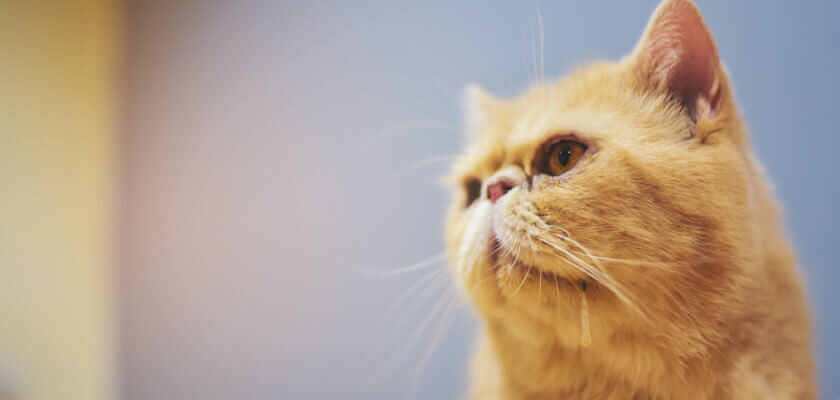Occasional drooling in cats is a normal occurrence, however, it can also indicate a variety of different illnesses and health issues your pet may be struggling with, from dental diseases through trauma to tumors. Whenever you notice your cat suddenly producing a lot of saliva, better get them checked by the veterinarian to rule out any potentially life-threatening causes of this behavior. If your kitty tends to occasionally drool when they are happy, relaxed, or while traveling in a vehicle, this is a completely normal phenomenon and shouldn’t make you worried.
When is it normal for cats to drool?
The reason why some felines drool and others never do, is still a mystery to us. One thing is sure: occasional drooling isn’t something to fret about. Check the possible reasons why your cat produces excessive slobber:
- They are contented. Have you ever noticed your cat drooling when they knead? This is an instinctive behavior that stems from their kittenhood. When kittens are small, they usually purr and knead their mom’s body while they are hungry to stimulate the flow of milk. At that time, they feel their birth giver’s love, which makes them feel secure. When adult cats are happy they may also knead, which activates their memory of blissful moments when their mother was feeding them, which, in turn, can lead to drooling.
- They are stressed. A frightened cat can also drool. If you are taking your cat to the vet, or they are in any other kinds of stressful situations, e.g., you have invited guests over that they are not familiar with, they may immediately start drooling. This is normal behavior.
- They hate traveling. Do you know that just like people and dogs, cats may also suffer from travel sickness? One of the visible symptoms of your cat feeling uncomfortable in a vehicle may be drooling. However, observations prove that most motion sickness in felines are caused by anxiety related to traveling. In some cases, slowly acclimating your cat to the car may turn out to be helpful.
Cat’s abnormal drooling. Reasons your cat may be drooling excessively.
There are several health conditions that may cause drooling. While many of them can be associated with the mouth area, drooling can also be a symptom of sicknesses attacking other parts and systems of their body.
1. Dental disease
Cats are prone to a number of oral health problems including plaque accumulation, tartar, gum diseases (from gingivitis to periodontitis), mouth ulcers, and tooth resorption. All of them may cause a variety of different symptoms, including bad breath, chronic pain that makes your cat eat less, and, of course, hypersalivation. If you notice any of these symptoms, call the vet immediately. Your cat is likely to need special treatment. If your cat is prone to excessive plaque, professional teeth cleaning can also do the trick.
2. Gastrointestinal disease
Drooling can be a sign that your cat doesn’t feel well and is going to throw up. If your pet seems to be nauseous, e.g., they have already vomited or lack appetite, a health check with your vet may be necessary as gastrointestinal problems may occur as a result of some more serious health problems.
3. Foreign body
One of the most common causes of drooling is that your cat has something stuck in their mouth or pharynx. This can be food, a blade of grass, hair, or some toy parts that your little friend tried to swallow. If you have a suspicion that your cat is drooling heavily because of a foreign body in their esophagus, call your vet straight away, as there is a possibility your little buddy can choke.
4. Upper respiratory infections
Upper airway infections may cause slobbering, and develop oral ulcerations. If you see that your cat is coughing, sneezing, has a runny nose or eye discharge, these may be the first symptoms of a severe illness that should be immediately treated by the vet.
5. Tumors
Like people, cats also can develop cancer. If the illness touches the tongue or the throat, your cat can experience troubles with eating, have bad breath, bleed from the mouth, and drool on a regular basis. A cancerous mass can accumulate at a rapid pace, so it is important to react as fast as possible.
6. Neurological problems
Some neurological lesions can also cause drooling in cats. When cranial nerves become damaged, they may impair your cat’s smell, taste, hearing, and vision. Naturopathies can also alter the facial expression, and swallowing, which can cause cats to drool.
When it comes to many cats, drooling is a natural body reaction to contentment or anxiety. However, it may also be a sign that your pet needs urgent help. If drooling lasts longer than a few minutes or occurs regularly, it can spell something more serious.
Similar Posts:
- Why Is My Dog Drooling So Much? Find Out Now!
- Why Does My Dog Chatter His Teeth? Canine Teeth Chattering Explained
- Why Does My Cat Twitch in Her Sleep? Dreams vs. Seizures
- Why Do Cats Knead with Their Paws?
- Do Cats Sweat? How Can You Keep Your Feline Friend Cool in Summer to Avoid Overheating?
- Why Does My Cat Suck on Blankets? Should I Be Worried?
- Why Does My Cat Headbutt Me – Kitty Headbutts Explained
- Do Cats Lose Baby Teeth? Here’s Everything You Should Know About Kitten Teething

